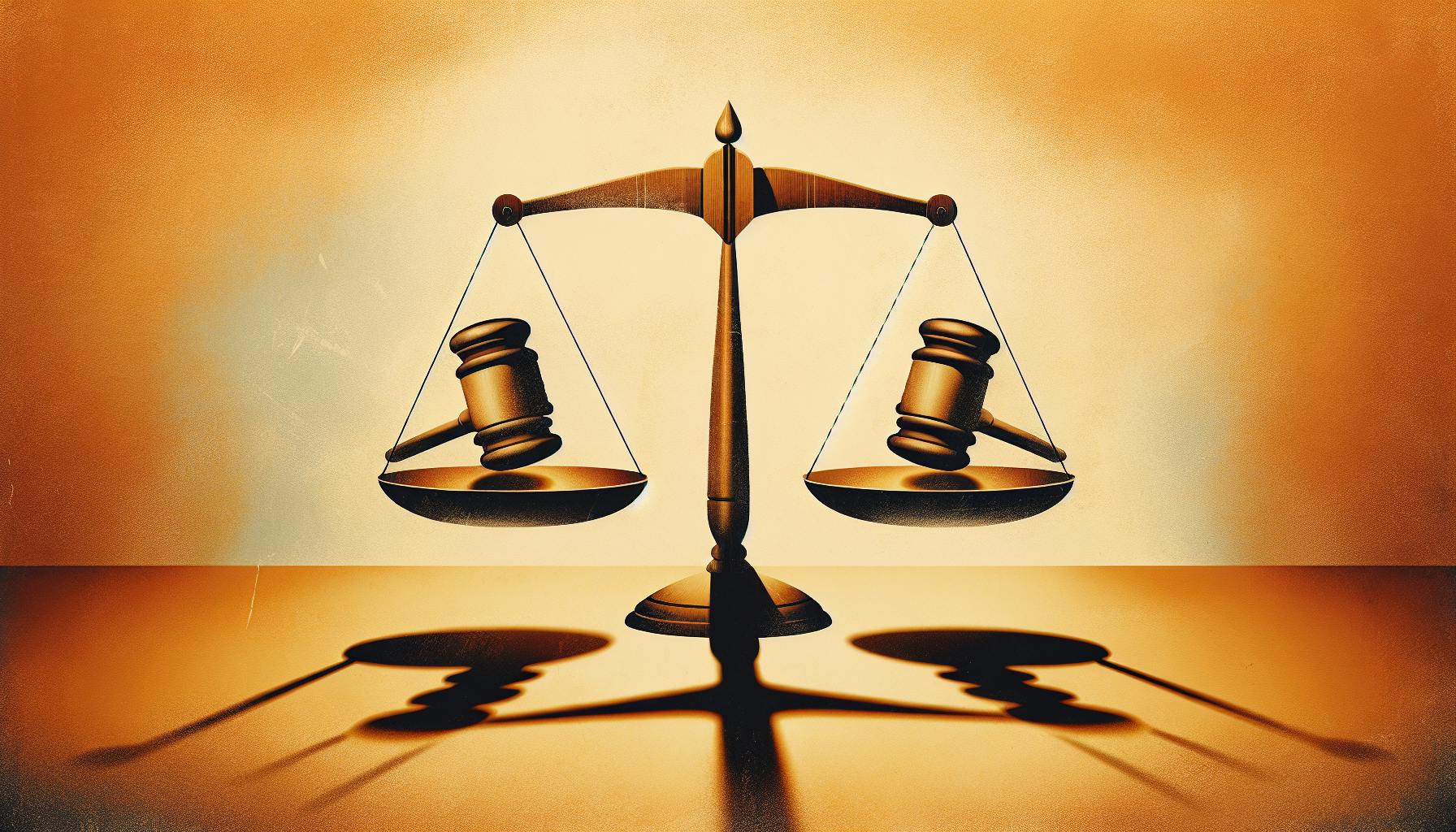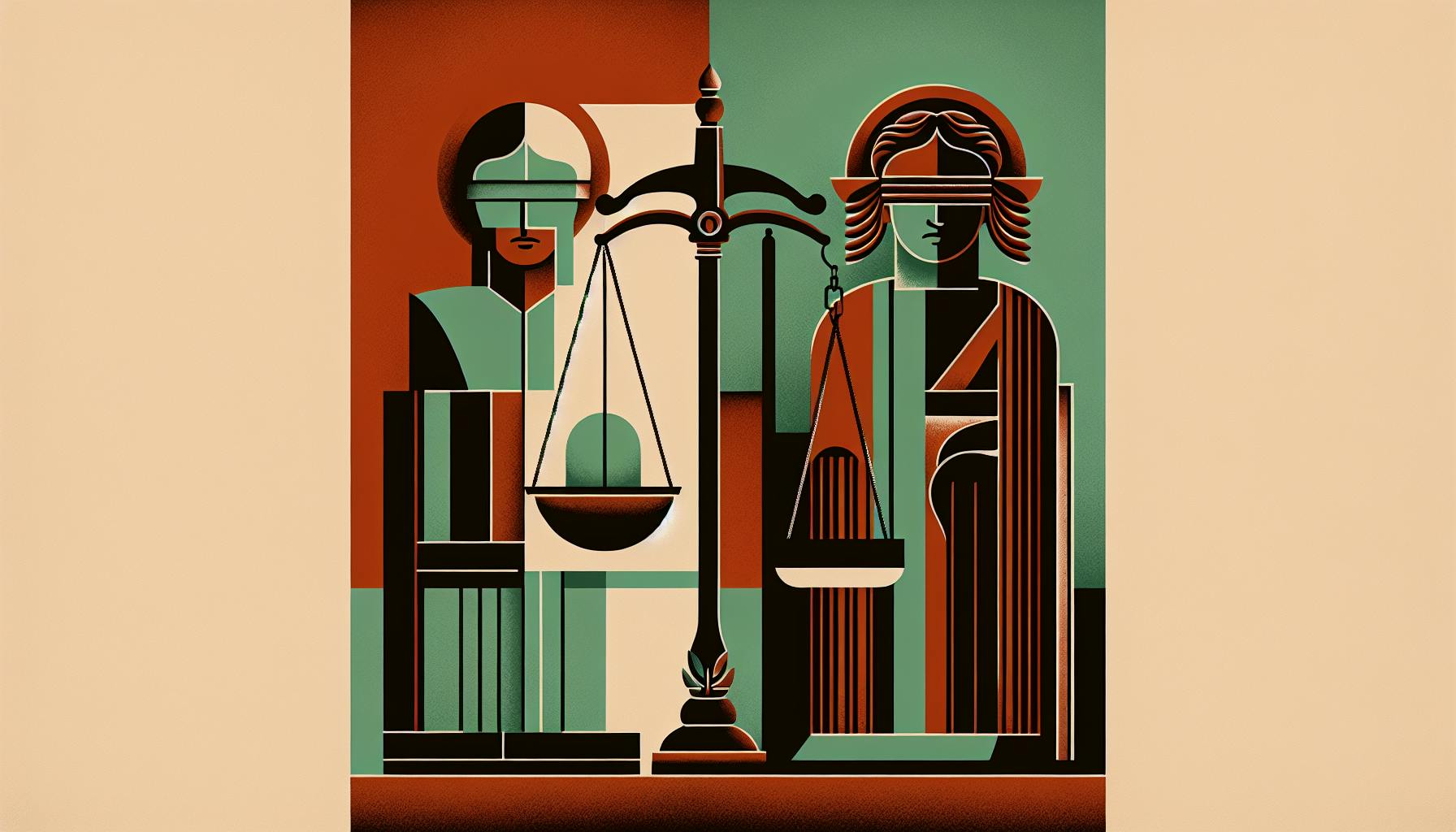Most would agree that laws restricting speech and expression, while seemingly reasonable during times of crisis, can set concerning precedents.
This article explores the history and implications of one such law - the Smith Act of 1940 - which made advocating the overthrow of the US government illegal.
We'll examine the Act's origins during WWII hysteria, its questionable constitutionality, infamous court cases, role in McCarthyist repression, and why it remains controversial today despite being largely defanged.
Introduction to the Smith Act
The Smith Act, also known as the Alien Registration Act, was a controversial law passed in 1940 that made it illegal to advocate the overthrow of the U.S. government. This section provides background on the act, including its purpose, key provisions, and historical context.
Origins and Purpose of the Smith Act
The Smith Act was introduced to restrict civil liberties and target political dissidents during World War II and the early Cold War era. Growing anti-communist sentiment and fears of Soviet subversion led Congress to pass this act aimed at curtailing "subversive activities" in the United States.
Key Provisions and Scope
The act criminalized advocating or belonging to any group that advocated the violent overthrow of the government. Violations were punishable by up to 20 years in prison. The act gave broad powers to investigate and prosecute individuals for sedition. It was later used to convict members of the Communist Party and other leftist groups.
Initial Targets and Early Use
Soon after passage, the act was used against members of the Socialist Workers Party and Communist Party USA. By 1956, over 140 leaders of the Communist Party were indicted under the legislation. These early cases established legal precedents regarding the act's scope and how it could be applied.
Defining the Smith Act: A Legal Overview
The Smith Act specifically outlawed advocating the duty, necessity, desirability, or propriety of overthrowing any government in the United States by force or violence. It also declared unlawful the printing, publishing, editing, issuing, circulation, sale, distribution, or publicly displaying any written or printed matter advocating such violent overthrow.
The Smith Act's Importance in American Legal History
The Smith Act marked a shift toward restricting civil liberties in the name of national security. It enabled broader government powers to investigate, prosecute, and silence political opposition groups. The act shaped legal responses to radical dissent and free speech for decades during the Cold War era.
Did the Smith Act violate the First Amendment?
The Supreme Court ruled in a 6-2 decision that the Smith Act did not inherently violate the First Amendment right to free speech and association.
The case involved the conviction of leaders of the Communist Party USA under the Smith Act for advocating the overthrow of the government. The defendants appealed their convictions, arguing that the Act violated their First Amendment rights.
In its decision, the Supreme Court recognized that the Smith Act did restrict First Amendment freedoms. However, it found that these restrictions were justified by the government's interest in national security and self-preservation.
The Court ruled that the Smith Act only prohibited speech that incited imminent lawless action or was likely to incite such action. Abstract advocacy of revolution was still permitted under the First Amendment. Essentially, the Court drew a distinction between radical rhetoric and directly inciting criminal conduct.
While civil liberties advocates criticized the decision as failing to adequately protect free speech, the Supreme Court majority felt it struck an appropriate balance between individual rights and public safety. The ruling upheld the constitutionality of the Smith Act while also limiting its application only to speech intended and likely to cause immediate harm.
Who did the Smith Act target?
The Smith Act primarily targeted members of the Communist Party USA (CPUSA). The act made it illegal to advocate or teach the violent overthrow of the US government. It also required all non-citizen adult residents to register with the government.
In the late 1940s and 1950s, the US government prosecuted over 140 CPUSA members under the Smith Act, including top leaders. Some of the more well-known Smith Act defendants included:
- Eugene Dennis - General Secretary of the CPUSA
- Gus Hall - Chairman of the CPUSA
- Benjamin Davis - New York City Councilman and CPUSA leader
- Elizabeth Gurley Flynn - Feminist, activist, and CPUSA leader
The Smith Act trials specifically targeted CPUSA leaders in an attempt to weaken the party's influence. The trials also aimed to stir up fears about communism during the Cold War era.
Many critics viewed the Smith Act prosecutions as a violation of civil liberties. The defendants' speeches and writings did not directly incite violence. So critics claimed the act infringed on rights to free speech and free association. However, prosecutors argued the CPUSA leaders posed a threat by advocating forceful overthrow of the government.
In the end, the Smith Act trials resulted in several convictions. But later appeals led to many of the convictions being overturned on technical grounds. The trials marked one of the most intense periods of political repression in modern US history.
What is the Smith Act of 1950?
The Smith Act, officially known as the Alien Registration Act, was a United States federal law passed in 1940. The law made it illegal to advocate or teach the violent overthrow of the U.S. government or to belong to any organization that engaged in subversive activities.
Some key points about the Smith Act:
-
It was passed in 1940 during World War II amid concerns over the spread of communism and fascism. There were fears that foreign agents could threaten national security.
-
The law made it a crime to advocate, abet, advise, or teach the duty, necessity, desirability, or propriety of overthrowing the government by force or violence. Simply holding membership in groups that did so was also illegal.
-
In the 1950s, the Smith Act was used to prosecute members of the Communist Party USA. Many convictions were later overturned after Supreme Court cases found the law violated First Amendment rights.
-
While still on the books today, the Smith Act has largely fallen into disuse after those Supreme Court decisions limited its application. However, it remains an important piece of legislation in U.S. history.
So in summary, the Smith Act was an anti-sedition law passed during the early Cold War era to ban subversive activities and groups seen as threats to U.S. national security. Its use declined significantly after major court rulings found it violated civil liberties, though it has never been fully repealed.
sbb-itb-e93bf99
Was the Smith Act ever repealed?
The Supreme Court significantly weakened the Smith Act in two important rulings in 1957 and 1958.
In the 1957 case of Yates v. United States, the Court ruled that teaching and advocating abstract communist ideology was protected under the First Amendment right to free speech. This meant that the government could no longer charge people for simply belonging to groups that advocated communism or teaching communist ideology, unless they actively incited violence.
The following year in 1958, the Supreme Court further limited the Smith Act in Dennis v. United States on appeal. The Court ruled that the government must prove a clear and present danger that the accused party is actively trying to overthrow the government. This raised the bar for Smith Act prosecutions.
While the Smith Act was never officially repealed, these two decisions gutted the law and made prosecutions extremely difficult. The era of widespread use of the Smith Act to target political dissidents and leftist groups effectively ended in the late 1950s as a result of these Supreme Court decisions.
Major Smith Act Court Cases
This section overviews several landmark Supreme Court cases involving the Smith Act during the 1940s-1950s, establishing key precedents on seditious speech.
Yates v. United States (1957)
The Yates decision overturned several Smith Act convictions, significantly limiting the act's applicability to speech.
In Yates v. United States (1957), the Supreme Court overturned the convictions of 14 Communist Party members under the Smith Act for advocating the violent overthrow of the government. The Court held that the Act required urging of concrete action, not merely abstract doctrine. This ruling limited prosecutions under the Smith Act to speech that directly incited unlawful action.
Dennis v. United States (1951)
In Dennis, the Supreme Court upheld Smith Act convictions of Communist Party leadership, establishing the "clear and present danger" test.
The Dennis case upheld conspiracy charges against the leadership of the American Communist Party under the Smith Act. The Court ruled that the First Amendment did not protect speech that presented a ""clear and present danger"" of inciting violence to overthrow the government. This established an important precedent on the limits of protected speech.
The Communist Party Cases and the Smith Act
This sub-section discusses the broader implications of Smith Act court cases involving members of the Communist Party of the United States.
The series of Smith Act cases targeting Communist Party members sparked debate about the act's infringement on civil liberties. Defendants argued the act violated rights to free speech and free association. Prosecutors claimed it was necessary to restrict dangerous, seditious speech. The cases highlighted tensions between national security interests and constitutional freedoms.
The Smith Act and the First Amendment: A Complex Relationship
Examining the tension between Smith Act provisions and the constitutional guarantees of freedom of speech and association.
The Smith Act raised complex questions about balancing free speech protections with national security interests. Its restrictions on certain types of political speech and association tested the boundaries of the First Amendment. Key cases like Yates and Dennis attempted to clarify these boundaries but also revealed the difficulties of balancing these competing concerns.
The Role of the US Supreme Court in Interpreting the Smith Act
An analysis of how the United States Supreme Court has shaped the enforcement and interpretation of the Smith Act through its rulings.
Through landmark decisions in cases like Yates and Dennis, the Supreme Court significantly influenced how the Smith Act has been applied. The Court's narrowing of the Act's scope focused enforcement on the most dangerous threats while aiming to protect civil liberties. However, questions remain about how to equitably balance security and rights. The Court's rulings defined key tests but have left room for interpretation.
The Smith Act in the Context of the Cold War and McCarthyism
The Smith Act, passed in 1940 as part of the Alien Registration Act, played a significant role during the Cold War era in efforts to suppress perceived Communist and Soviet sympathizers in the United States. Its vague wording banning advocacy of overthrowing the government was used extensively during the McCarthy era to stifle political dissent.
The Alien Registration Act's Role in Anti-Communist Efforts
The Smith Act made it illegal to advocate or teach the overthrow of the US government. It was used by the House Un-American Activities Committee (HUAC) to investigate and prosecute alleged members of the Communist Party USA. High profile cases like Eugene Dennis vs. United States in 1951 led to the imprisonment of several party leaders.
The act gave the government sweeping powers to suppress communist ideologies and affiliations. Its loose interpretation allowed prosecution of many dissenters, seriously undermining civil liberties protections during the Cold War.
McCarthyism and the Smith Act: Suppressing Dissent
Senator Joseph McCarthy capitalized on fears of Soviet subversion to conduct aggressive investigations aimed at exposing communists in American society. The Smith Act became a key tool for prosecutors aligning with McCarthy's agenda.
In the early 1950s, membership in the Communist Party USA declined dramatically as the Smith Act was used to harass and prosecute members. The act limited free speech, freedom of the press, freedom of association, and other civil rights in the name of containing communism.
From World War II to the Cold War: The Smith Act's Evolution
Originally intended to contain fascism and Nazism during WWII, the act took on new purpose during the Cold War. While it initially targeted extremist plots, its scope expanded to restrict even peaceful opposition to government policies.
Defendants were prosecuted for distributing communist literature and participating in meetings and rallies. Over 140 leaders of the Communist Party were accused, with over 100 convicted based on weak evidence of an organized plot to overthrow the government.
The American Civil Liberties Union and the Smith Act
The American Civil Liberties Union (ACLU) provided legal counsel to defend many accused communists. They argued the Smith Act prosecutions violated First Amendment free speech protections.
In the 1957 Yates v. United States ruling, the Supreme Court narrowed the Smith Act's application, ruling that teaching communistic ideology was allowable so long as it did not directly incite immediate violent action. This helped temper use of the act to silence political dissent.
The ACLU was instrumental in eventually overturning many Smith Act convictions after years of appeals, though defendants had already served much of their unjust prison sentences.
The Smith Act Today
Scaled Back Application
After the Yates decision and changing social attitudes, the Smith Act fell out of favor as a tool to restrict political dissent and speech. Prosecutions under the Act became rare, though it remained on the books.
Criticisms and Calls for Repeal
Civil liberties advocates have argued that the Smith Act violates First Amendment rights to free speech and association. There have been calls to repeal the Act, though it still technically remains in force. Some legal experts believe it could potentially be invoked again under extreme circumstances.
The Smith Act's Current Status and Relevance
The Smith Act is still part of federal statutory law, but it is rarely used today. The last major case was in 1961. However, legal scholars say its existence still poses concerns about infringement of civil liberties. There is disagreement about whether the Act serves any practical purpose in modern times versus violating constitutional freedoms.
The Smith Act Full Text and Its Interpretation Today
The full text of the Alien Registration Act of 1940, including the Smith Act provisions, is available from government sources. However, based on subsequent Supreme Court decisions like Yates, Dennis, and Brandenburg, much of the Act would likely be found unconstitutional if challenged today. The courts have significantly narrowed the scope of punishable subversive speech and association over the past 60+ years.
Conclusion: Reflecting on the Smith Act's Legacy
The Smith Act's Role in Shaping Sedition Law
The Smith Act had a significant influence on sedition laws in the United States. By criminalizing advocacy of overthrowing the government, it expanded the legal definition of sedition. Key court cases like Dennis v. United States further shaped legal interpretations of what constitutes illegal sedition under the Smith Act.
Although parts of the Act were later ruled unconstitutional, it still plays an important role in limiting speech that directly incites violence or illegal action against the government. The "clear and present danger" test established in Schenck v. United States and refined in Brandenburg v. Ohio owes some of its origins to cases related to the Smith Act.
So while the Smith Act itself faded in prominence, it left a legacy that continues to impact how sedition laws are applied today. The boundaries between protected free speech and illegal incitement remain heavily influenced by the Act's history.
Lessons Learned from the Smith Act's History
The Smith Act provides some important historical lessons about the use of sedition laws to suppress political dissent. During periods like the Red Scare of the 1940s and 1950s, the Act was used to persecute communists and anti-war activists. This demonstrates how sedition laws can be misused to violate civil liberties.
The Supreme Court eventually stepped in to overturn parts of the Act on First Amendment grounds. This highlights the need for scrutiny over any laws that limit free speech rights. It also shows why a strong system of checks and balances is necessary to prevent overreach in defining or prosecuting sedition.
In the end, the Smith Act was an overly broad law that infringed on Constitutional rights to free expression. Its history is a reminder that in times of crisis, governments may try to increase their powers in ways that undermine civil liberties. Eternal vigilance is required to defend freedom of speech.
The Smith Act Passed into History: A Retrospective
The Smith Act was very much a product of its time. Passed in 1940 as fascism and communism rose in Europe, it reflected fears of ideological threats to American democracy. But in practice, it was used to stifle political dissent rather than address any real danger.
As the Red Scare faded, the Act's use declined. Parts of it were repealed in the 1950s, and Supreme Court rulings struck down significant sections as unconstitutional. The last prominent use was against communist and socialist groups in the late 1950s and early 1960s.
So while the Smith Act once held real power - even sending people to prison for their political beliefs - it ultimately passed into history. Yet its legacy remains in ongoing debates over the line between free speech and sedition. The Act profoundly shaped this legal boundary in its brief era of influence. Though gone, its presence is still felt whenever sedition laws are tested in court.


